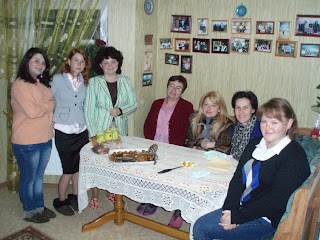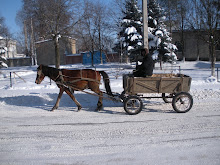It would be unfair, inconclusive, and unsettling if I wrote about any of the electoral outcomes I have witnessed in Moldova. The mission of my organization is world peace and friendship. On a day-to-day basis, this rural youth-development worker is hardly ever impacted by the political climate of the country. I do not make any concerted effort to contribute to the marketplace of political ideas and solutions. I hear what I hear, read what I read, but tend not understand the implications of everything I'm told. I can practice empathy, but I'll leave economics of developing countries to the experts.
Yet, with local elections for mayoralties and city councils just around the corner, politics are starting to matter in the daily lives of my friends and neighbors. When I first started hearing the stories I'm about to share, my immediate response was to ask "What year is this?! How is this happening?!"
Thankfully, I took some time to unpack these stories and their implications before deciding to share them with you. I now understand my immediate reaction as ethnocentrism and ignorance at their worst. My reaction was ethnocentric because I recognized these stories as replications of history's hardships, and my socialization encourages progress to the point that we attempt (though not always successfully) to avoid those Polaroid-perfect hardships. My reaction was ignorant, because I though I have lived in Moldova for two years, American tax payers are very generous. Never do I think twice about buying bananas in winter, the Peace Corps doctors recommend it! Never do I worry about my house being cold, Peace Corps pays the bill! Though I have lived without many contemporary American comforts, it's not as if I truly had to make it on my own as my Moldovan friends and neighbors.
These stories were told to me by my host mother. Her political affiliation doesn't matter, because both of the political camps chose the methods she described. Let me say that one more time for clarity, both political camps are described below, using the exact same tactics.
First, she told me that our elderly neighbor (who would otherwise never leave home) took part in a political rally in a neighboring town this week. When my host mother questioned her about her motivates, she said the political party sponsoring that rally gave all the participants a chicken, fish soup, and half-liter of wine. She took the food in exchange for her support of that party.
This is when that ignorant reaction came into play.
The next night, my host mother said the same neighbor admitted she is conflicted about her vote. She really needed that chicken from the rally and committed to voting for that party. But now a different party is offering other goods to potential voters. This party is giving away sacks with a kilogram each of rice, sugar, and flour.
Again, ignorance and ethnocentrism came shooting up my spine, flooding my thoughts with images of Stalin, Animal Farm, and the hammer and sickle icon still hanging on many public buildings in town. But I'll say it again, both political camps are using this exchange of basic commodities for votes. It is not as red as this ignorant American would have assumed. It doesn't matter what party gave my neighbor a chicken and what party might give my neighbor flour. The news merely hit me in that shocking way that stops one mid-breath without knowing precisely why or if it should. The kind of news one must commit to understanding immediately, or it will be forgotten just as quickly.
I suppose hearing this news startled me because I understood it to be wrong, and the exact opposite of the progress my culture promotes. But then I thought, it doesn't matter what I think, I am neither a beneficiary or victim of these tactics.
The only thing I can really know is that a beneficiary of these tactics (my neighbor) is confused, and a victim of these tactics (my host mother) doesn't blame the beneficiaries for participating, but yearns for progress she sees other countries making on the evening news. "How can someone who watches the news still think that giving away bread is something we do to earn votes in this modern year?" She asks, again and again.
I don't have an answer for her now, but try to explain that life isn't a sweet peach in America right now either. That's a lie. How can I honestly say that it's hard for the elderly in America right now too? How can I say medicine is expensive for them and that our government is arguing over how to care for them? I can't. Put in my neighbor's position, a chicken and kilogram of flour would sound pretty good to all of us.
Go ahead, call me privileged and pretentious. The former I am learning to accept, the latter is what makes people write blogs in the first place.
Yet, with local elections for mayoralties and city councils just around the corner, politics are starting to matter in the daily lives of my friends and neighbors. When I first started hearing the stories I'm about to share, my immediate response was to ask "What year is this?! How is this happening?!"
Thankfully, I took some time to unpack these stories and their implications before deciding to share them with you. I now understand my immediate reaction as ethnocentrism and ignorance at their worst. My reaction was ethnocentric because I recognized these stories as replications of history's hardships, and my socialization encourages progress to the point that we attempt (though not always successfully) to avoid those Polaroid-perfect hardships. My reaction was ignorant, because I though I have lived in Moldova for two years, American tax payers are very generous. Never do I think twice about buying bananas in winter, the Peace Corps doctors recommend it! Never do I worry about my house being cold, Peace Corps pays the bill! Though I have lived without many contemporary American comforts, it's not as if I truly had to make it on my own as my Moldovan friends and neighbors.
These stories were told to me by my host mother. Her political affiliation doesn't matter, because both of the political camps chose the methods she described. Let me say that one more time for clarity, both political camps are described below, using the exact same tactics.
First, she told me that our elderly neighbor (who would otherwise never leave home) took part in a political rally in a neighboring town this week. When my host mother questioned her about her motivates, she said the political party sponsoring that rally gave all the participants a chicken, fish soup, and half-liter of wine. She took the food in exchange for her support of that party.
This is when that ignorant reaction came into play.
The next night, my host mother said the same neighbor admitted she is conflicted about her vote. She really needed that chicken from the rally and committed to voting for that party. But now a different party is offering other goods to potential voters. This party is giving away sacks with a kilogram each of rice, sugar, and flour.
Again, ignorance and ethnocentrism came shooting up my spine, flooding my thoughts with images of Stalin, Animal Farm, and the hammer and sickle icon still hanging on many public buildings in town. But I'll say it again, both political camps are using this exchange of basic commodities for votes. It is not as red as this ignorant American would have assumed. It doesn't matter what party gave my neighbor a chicken and what party might give my neighbor flour. The news merely hit me in that shocking way that stops one mid-breath without knowing precisely why or if it should. The kind of news one must commit to understanding immediately, or it will be forgotten just as quickly.
I suppose hearing this news startled me because I understood it to be wrong, and the exact opposite of the progress my culture promotes. But then I thought, it doesn't matter what I think, I am neither a beneficiary or victim of these tactics.
The only thing I can really know is that a beneficiary of these tactics (my neighbor) is confused, and a victim of these tactics (my host mother) doesn't blame the beneficiaries for participating, but yearns for progress she sees other countries making on the evening news. "How can someone who watches the news still think that giving away bread is something we do to earn votes in this modern year?" She asks, again and again.
I don't have an answer for her now, but try to explain that life isn't a sweet peach in America right now either. That's a lie. How can I honestly say that it's hard for the elderly in America right now too? How can I say medicine is expensive for them and that our government is arguing over how to care for them? I can't. Put in my neighbor's position, a chicken and kilogram of flour would sound pretty good to all of us.
Go ahead, call me privileged and pretentious. The former I am learning to accept, the latter is what makes people write blogs in the first place.










































